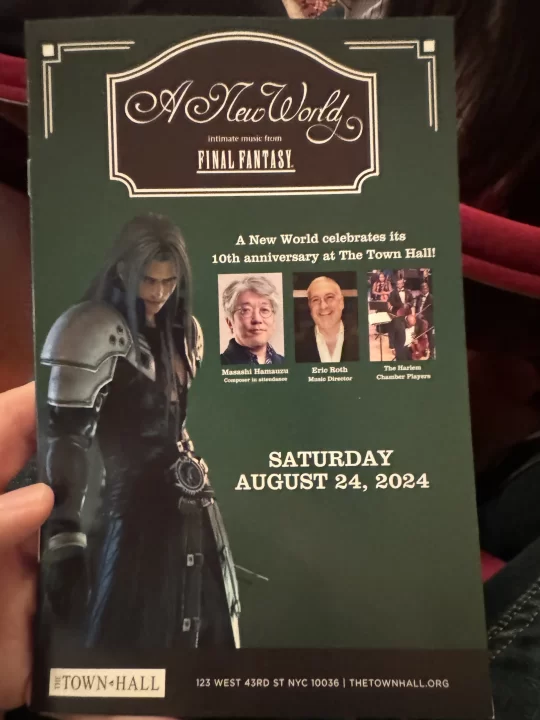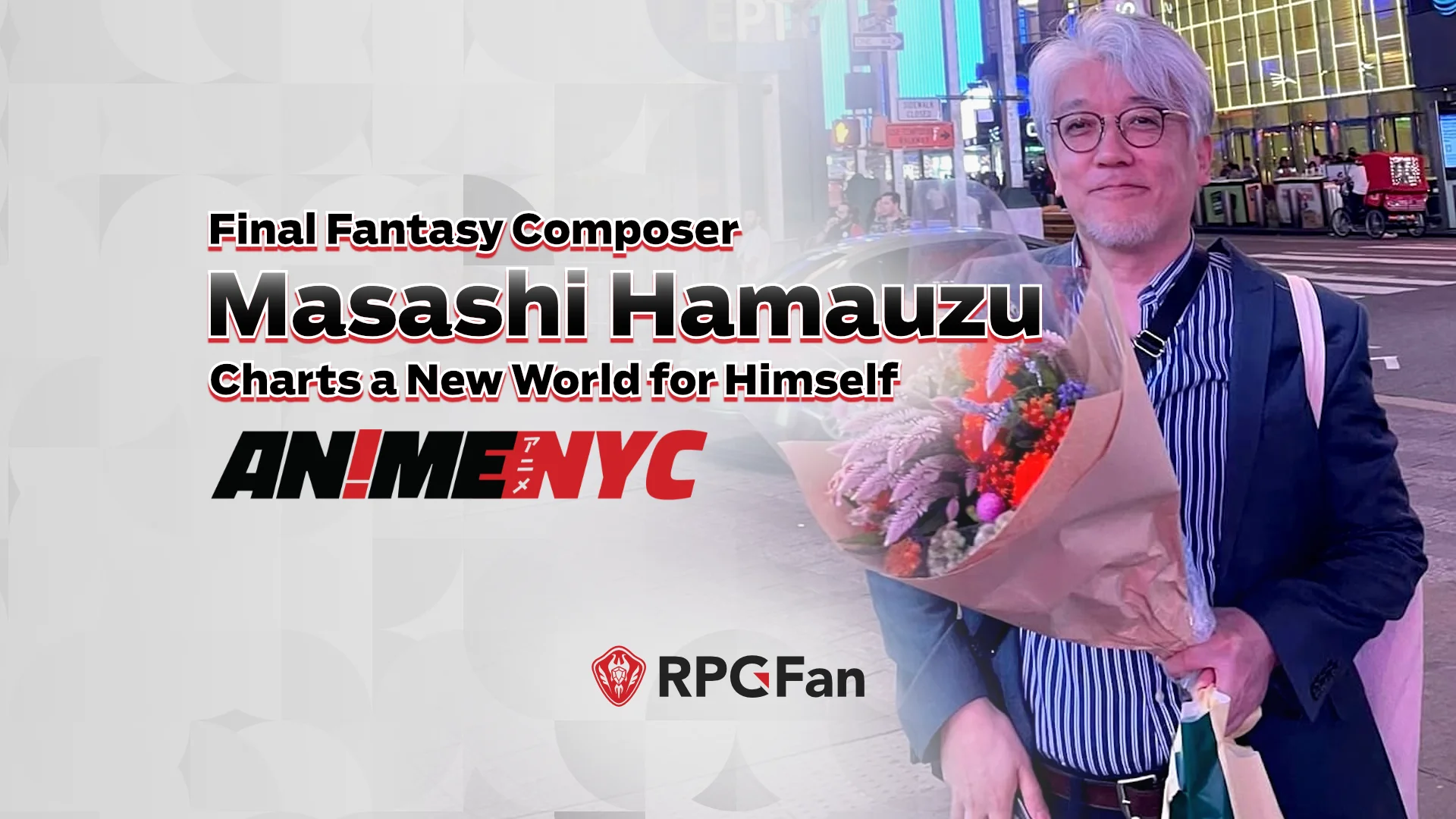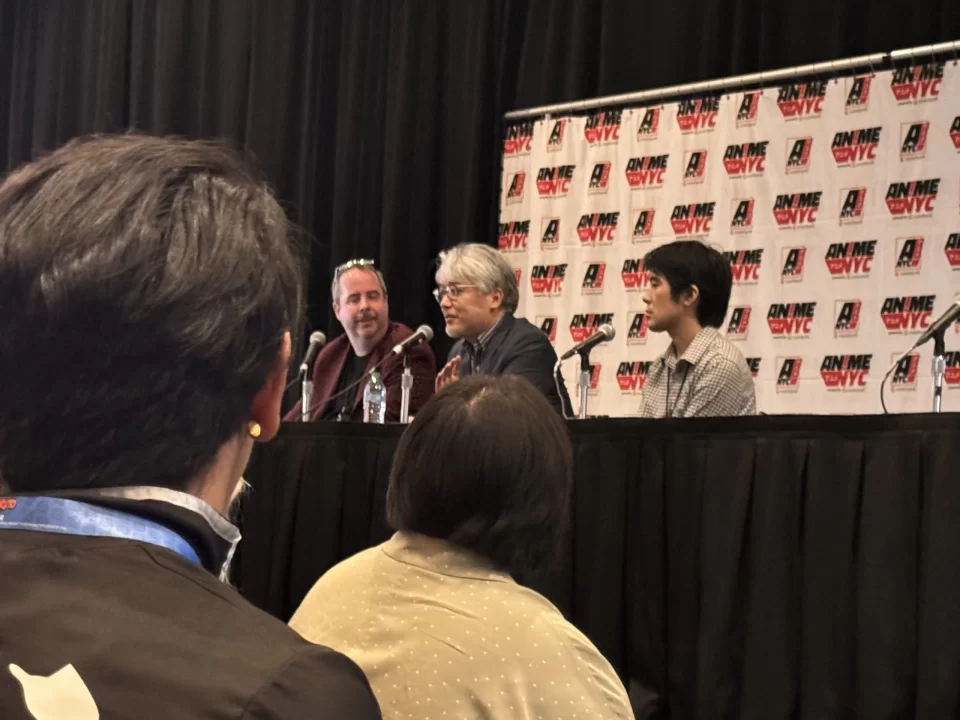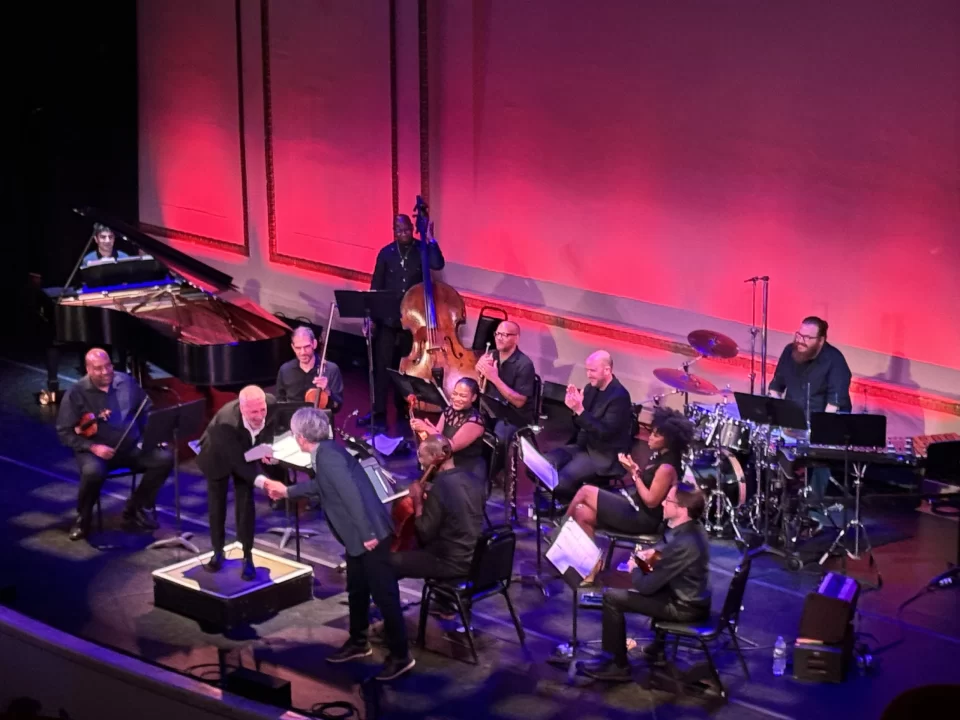Some heroes go unsung. Masashi Hamauzu stands as a stark example of this. He’s composed part or all of many Final Fantasy soundtracks you love (most notably X, XIII, and the Final Fantasy VII remake project). Sadly, these contributions become overshadowed by the star power of Uematsu, Soken, and Shimomura. Hamauzu provided a potent reminder of his legacy with an appearance at Anime NYC, followed by a performance of his music that night at the A New World concert.
His panel at Anime NYC attracted a modest crowd, but what mattered most was that every person in that room was there to geek out over the music that has fueled our Final Fantasy journeys. This included moderator Chris Opperman, who joined the crowd in heaping praise upon Hamauzu and his work. Opperman—who works as an arranger and orchestrator for AWR Productions, the team behind Distant Worlds, A New World, and other JRPG orchestras—asked Hamauzu a range of questions that spanned from the inspiration he took from his family to the unique role he played in the creation of an Uematsu classic.
Hamauzu was born to two musically talented parents in Germany. His father was an opera singer, while his mother—a college professor by trade—learned piano during her childhood, something Hamauzu associated with her well-off upbringing. However, he didn’t immediately come to love the piano himself. “When I was younger, I played the piano just for fun, so I didn’t really like the piano lessons I would attend all the time,” Hamauzu admitted. “But when I was in high school, I heard Debussy, and I was really enamored by his work. That was the first time I decided to play a piano piece on my own accord.”
He particularly took to Claude Debussy, as the children’s choir group run by his father sang from the French composer’s catalogue often. Hamauzu noted a love for his “very deep, complex chord progressions.” He similarly accredited this quality to Ryuichi Sakamoto’s compositions, another of his formative influences. Hamauzu’s emphasis on chord progressions above every other aspect of music composition was a point he’d expand upon, “One of the reasons I feel this way is that whenever I make video game music, regardless of the story, whether it’s in the climax or a lull in the action, the music itself remains the same. I have to make sure the song is able to fit any sort of situation within the story. I feel that chord progression puts a lot of work into that.”
Speaking on his influences further, Hamauzu responded to a fan question surrounding the jazz influences in Final Fantasy, including some of his own soundtracks. Surprisingly, these genre twists (which typically spawn from client requests, not his own musical preferences) manifest in his music through pure vibes. “I actually don’t draw inspiration from specific artists; I just compose it myself based off feel,” Hamauzu said. “I [also] gather resources that might sound similar to that style.”
Koichi Sugiyama of Dragon Quest fame is also a well-documented inspiration for Hamauzu, one so profound that it kickstarted his career. In his childhood, video game soundtracks “[weren’t] really produced by computers but the programmers themselves.” Sugiyama and his classic compositional credentials were, therefore, a sea change for the industry. “It also birthed a lot of people—myself included—to want to make music specifically for video games,” Hamauzu noted. This wasn’t his only reason for following in his parents’ footsteps, however; his brother’s boxing career troubled Hamauzu because it involved hurting people, something he felt music had the opposite effect of. So, video game composition it was, and off to Squaresoft he went.
Only Hamauzu didn’t get what he bargained for. “When I first joined the video game industry, video game music was still 8-bit or 16-bit electronic sounds,” Hamauzu reminisced. “I thought those were the kind of songs I was gonna make. I was like, ‘Oh yeah, I can make those songs.’ But when I joined, [the industry] was … moving on to making movie-score level orchestral music. I had no experience with that, so I spent countless hours staying up all night with only two hours of sleep, trying to learn composing orchestral music on my own as I was writing the pieces.”
One such early work doesn’t actually have his name on it but probably should. His contributions to Nobuo Uematsu’s arguable opus “One-Winged Angel” were nothing short of pivotal. His task was bringing together a choir for the song, likely due to studying choral music in college. This was a huge benefit for Uematsu because vocal tracks were all but unheard of in video game music at the time, let alone whole choirs. He needed someone who knew their stuff, and the then-new hire Hamauzu fit the bill. The fresh-faced composer even included his own voice to the mix. Speaking to this further, Hamauzu said, “I had no idea it would have this much of an impact worldwide and nowadays I have to make ten-minute arrangements of ‘One-Winged Angel.’”

This referenced arrangement is “One-Winged Angel – Rebirth” for Final Fantasy VII Remake, which, for my money, is the ultimate version of the track. I was surprised to learn that he pushed back hard against arranging it, though. In fact, he didn’t even want to be a part of Remake to begin with. He explained, “I felt that from all the years of arranging for [Uematsu], I’d already done everything I could, so I really didn’t want to do this arrangement work. I declined the offer a couple times, but after many years, they finally convinced me, and I started working on it.”
His ethos was thus not to recreate Uematsu’s work verbatim but instead follow his own process. Said process can take many forms, from simply sitting down in front of a keyboard and seeing what sounds emerge to looking at non-music reference material to draw inspiration and build a song around. He also discussed a third, “rarer” method wherein he’ll hear a song in his dream, “wake up still drowsy” to record it on his computer, and in the morning wake up to realize it was great. Alternatively, “Sometimes it’s completely useless, though.” This got a laugh out of the room, likely because we fellow artists of all flocks know this particular process all too well.
One fan asked what his favorite track off Final Fantasy VII Rebirth was, to which he responded, “I really like ‘Loveless.’ The reason for that is the visuals that came alongside it really drew a lot of inspiration for me, and the song popped up immediately. I had no troubles thinking about a composition for the visuals. I felt that out of all the songs I’ve worked on, that came out the best.” This was in stark contrast to the Gapra Whitewood theme from Final Fantasy XIII that Opperman played for the audience, which Hamauzu produced based entirely around his enjoyment of the instruments and musicality rather than the area’s atmosphere.
Perhaps the most unexpected (and certifiably strangest) part of the panel was when Opperman screened a 2017 music video called “I want to Assassinate,” which Hamauzu directed, edited, and composed for his music duo IMERUAT. Hamauzu was clearly amused to see the video played, saying with slight trepidation, “I made a music video with a really threatening title and I’m sure there are assassinations occurring worldwide, so I was very scared about it.” Given the recent assassination of former Prime Minister Shinzo Abe, the content of this video rings a bit differently now. It’s still a fascinating portal into the many talents I had no idea Hamauzu possessed, and I particularly enjoyed its borderline Lynchian ending.
As well as the panel went, Hamauzu’s true victory lap came as he attended as the guest of honor at the A New World concert that evening at the nearby The Town Hall theater. A New World is a chamber orchestra spin-off of Distant Worlds, paring the typical symphony ensemble down to (in this instance) 11 musicians and removing the video screen. This made for a show that was far more intimate. Each musician had room to shine, and their comfort playing together precluded the musical messiness I’ve often found Distant Worlds to suffer from. The roughly 90-minute set hit the gamut of Final Fantasy composers but put a special emphasis on Hamauzu’s work.
Hamauzu only appeared on stage briefly at the start and end of the performance, but his presence lingered through his music. Highlights of his work included orchestral arrangements of “Besaid” from Final Fantasy X, the premiere of “A Broken World” from Final Fantasy VII Remake (so potent I could practically hear Barret screaming the names of his ex-teammates), and a special performance of “The Promise” from Final Fantasy XIII during the encore, in which conductor Eric Roth sang the vocal track. He’s certainly no trained singer, but his humorous candor throughout the night and clear reverence for Hamauzu made it a charming, heartfelt moment.
Speaking to the concert more broadly, the setlist split between deeper cuts in its first half that you’d never find on a Distant Worlds stage and the time-honored classics like “Zanarkand” and “One-Winged Angel.” The former was as beautiful as ever, and somehow the chamber orchestra made Sephiroth’s pseudo-theme sound more chilling than the typical symphony orchestra does. Final Fantasy XIV fans also sonically ate well, though I’m not far enough into my Eorzea adventures to recognize the tracks. My personal favorites included “A Place to Call Home & Decisive Battle,” “Setzer’s Theme” from Final Fantasy VI, and the town theme from the game that started it all. But if we’re being honest, the real show-stealer was the “Chocobo Medley” finale in which Roth played a slide whistle which he summarily mic-dropped after a solo at the song’s end. What can I say, I’m a sucker for a good mic-drop, and this was up there with the best of them.
The perfect cap on a day of Hamauzu came when a pair of fans came to give him and Roth flowers at the end of the performance. It’s a gesture that’s perhaps cliched but means a lot for a composer often left out of discussions he has more than earned his seat in. Given an anecdote I heard from a friend about a convention appearance a few years back where only seven people showed up for Hamauzu’s panel, this show of appreciation alongside a much-increased turnout at Anime NYC is affirmation that his legacy is as important to fans as it is the history of Final Fantasy music.
If you’re interested in diving deeper into Masashi Hamauzu’s music, check out our Rhythm Encounter podcast episode from earlier this year.





